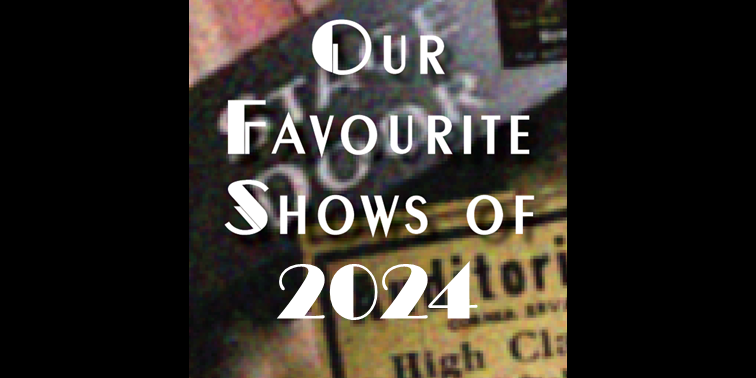
31 December 2024
StageTalk closes 2024 with a really heartfelt “Thank you” to all our readers, to those of you who subscribe, and to those who just dip in on an occasional visit to the magazine. All of you have helped to make our publication a recognised voice. Our aim is to support live theatre and our reviewers have attended many varied shows throughout 2024. Their great quality and range can be seen in below in our highlights of the past 12 months. Now, as a New Year of theatre begins, we look forward to seeing you again throughout 2025.
SIMON BISHOP 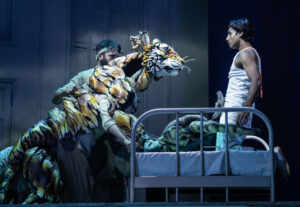
There have been several stand-out productions throughout the year, and 2024 started spectacularly with a delightfully imaginative production of Life of Pi on tour after successful runs in the West End and Broadway. This was thrilling theatre-making at its best. Puppet designers Nick Barnes and Finn Caldwell as well as the teams of operators seemed to have inhabited the very souls of the animals they created, so lifelike were their shapes, sounds characteristic movements. An absolute hit on the expansive Bristol Hippodrome stage.
At the Bristol Old Vic in early March, there was for me at least, a surprise hit – Starter for Ten, the stage adaptation of author David Nicholls’ first novel about a teenage boy, Brian, getting on his university’s University Challenge team. Driven all the way by a pulsing nostalgic eighties soundscape, the finale, when it came, was met with a standing ovation.
Looking for one individual performance to stand out amongst all others – I would nominate Tamsin Greig playing Hester Collyer in Terence Rattigan’s The Deep Blue Sea at the Ustinov, Bath. Made famous by Peggy Ashcroft in the original casting, the role of Hester is now recognised as being one of British theatre’s greatest female roles. Tamsin Greig’s visceral portrayal of a woman looking into an emotional abyss was exceptional. Greig mastered Hester’s switches from unrequited romantic to caustic self-critical commentator throughout a riveting performance.
Sometimes a production reaches a level one never anticipated. That was certainly true of Kyoto. In this Good Chance/RSC collaborative political cliff-hanger at the Swan Theatre, Stratford, playwrights Joe Murphy and Joe Robertson dissected the myriad diplomacies, decision makers and disrupters behind the adoption of the Kyoto Protocol at COP3 in 1997. What could have been a re-enactment of a potentially bland sequence of convention votes was instead turned into a pacy and razor-sharp political thriller working on many levels – unforgettable.
The Tony and Laurence Olivier award-winning play, The History Boys appeared at the Theatre Royal, Bath in August. Directed by Seán Linnen, this production felt as fresh as the day it was conceived by Alan Bennett, perhaps even upping its pulse with the injection of well-known eighties pop riffs at scene change-overs. A terrific cast pushed this tale of clashing attitudes to education and sexual fluidity along at a pace that had a captivated audience hanging on to every word.
And finally, hats off to a stunning pre-Christmas production of Mary Poppins at the Bristol Hippodrome. Twenty years since the show premiered here, the stagecraft and storytelling of this Mary Poppins managed to reach new giddy heights.
ROS CARNE 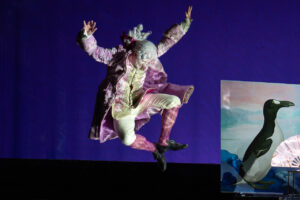
Opera kicks off my list of Stagetalk picks from 2024. Two striking productions at the Oxford Playhouse stand out, a joyful revival of Gilbert and Sullivan’s HMS Pinafore from Opera Della Luna and a brilliant, fast-moving version of Stravinsky’s The Rake’s Progress from English Touring Opera. Both were arranged for small ensembles, the first becoming part of the action as an onstage band, the second making rare and welcome use of the Oxford Playhouse’s wide orchestra pit.
At a time when touring opera groups are forced to close down and even large national companies are struggling to survive, it’s cheering to report that both shows played to packed and enthusiastic houses. Any Gilbert and Sullivan is an immediate favourite with its familiar tunes, comic exuberance and sharp, satiric libretto, but Stravinsky is not an obvious crowd pleaser. Congratulations are due to the Playhouse for scheduling this complex and sophisticated twentieth century masterpiece.
The operatic theme spills over to my first choice from Stratford upon Avon, Ben and Imo, a tense two hander at the Swan Theatre by contemporary playwright, Mark Ravenhill. The focus is the fraught professional partnership between Benjamin Britten and Imogen Holst as they work together to complete the composition of Britten’s opera Gloriana in time for the Coronation of Queen Elizabeth II. Actors Samuel Barnett and Victoria Yeates held us captivated as the musical genius and his great enabler.
It was an unusual choice for the Royal Shakespeare Company whose principal mission is to bring our great national dramatist to relevant life, a task in which it excels. This year was no exception. Three productions stood out for me. First of these was Blanche McIntyre’s hysterically funny suburban revisioning of The Merry Wives of Windsor. I thought I couldn’t be surprised by another Falstaff. I was wrong. John Hodgkinson’s pompous absurdity and brilliant comic timing brought a startling contemporary dimension to the role. Next in line was Othello, directed by Tim Carroll. A stark minimalist set, and haunting percussive sound evoked an atmosphere of foreboding as a backdrop to three powerful central performances. John Douglas Thompson as Othello and Will Keen as Iago were wonderfully matched by Juliet Rylance’s heart-rending Desdemona.
My final pick has to be Pericles at the Swan Theatre in August, a rare production of an epic and fantastical drama, one of Shakespeare’s most problematic plays. It was a bold debut by RSC’s new artistic director Tamara Harvey. She brought a haunting dreamlike feel to the play, movement, light and sound creating a magical world on stage. Despite all odds, the rambling narrative began to make sense as a fable of love, loss and renewal and the audience were entranced.
MIKE WHITTON 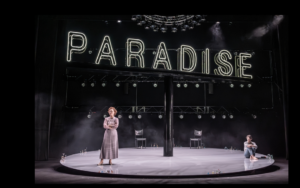
This was a year when thoughtful and well-crafted revivals brought new energy to some old favourites. The best of these was director Atri Banerjee’s minimalist reinvention of Tennessee Williams’ semi-autobiographical The Glass Menagerie, at the Bristol Old Vic. It featured an exceptionally touching performance from Natalie Kimmerling as the socially anxious Laura, a fragile creature whose dreams prove to be as easily shattered as her precious glass unicorn.
If there is still anyone who thinks that the plays of Noël Coward and Terence Rattigan should be written off as hopelessly passé, excellent revivals at Bath’s Theatre Royal offered powerful evidence to the contrary. I was particularly impressed by Rattigan’s Table Number Seven and Coward’s A Song At Twilight, both of which convey a plea for tolerance and understanding that surely has a contemporary relevance.
Most joyously inventive show of the year was Pinocchio at The Watermill Theatre. This enchanting piece of family entertainment, co-directed by Indiana Lown-Collins and Elle While, interwove song, dance, puppetry and physical comedy to great effect. If only all the shows offered at the Christmas season could be as good as this!
The very best of the year? Opera Project’s The Marriage Of Figaro at Tobacco Factory Theatres is a serious contender for the top spot. Beautifully sung, especially by Galina Averina as the Countess, and with high-spirited comedy from Anna-Luise Wagner’s naughty Cherubino, this was chamber opera of the highest quality.
But my number one show of the year is WNO’s Death In Venice at the Bristol Hippodrome. Directed by Olivia Fuchs, this very effectively used the aerial gymnastics of NoFit State Circus as a metaphor for the theme of risk-taking in the pursuit of beauty. Visually stunning, this challenging and morally ambiguous opera was spellbinding from start to finish. It is appalling that an opera company that can create work as compelling as this should be forced to make drastic job cuts and to cancel several performances due to a 35% reduction in ACE funding.
TONY CLARKE 
It has been another twelve months in which I have been privileged to see such a wide range of superb shows across the region.
The power and pleasure of live theatre were best illustrated for me by several standout productions in 2024: Patrick Barlow’s hilarious, long-running spy romp The 39 Steps (Malvern Theatres) continues to amaze and amuse audiences in equal measure whilst Original Productions’ The Time Machine at Cheltenham’s Everyman Theatre was one of the funniest, cleverest shows I have seen in many years. Cirencester’s Barn Theatre continues to consistently produce a refreshing blend of familiar reworkings and new offerings: Sam Denia gave an uncanny and very funny impersonation of Frank Spencer in Some Mothers Do ‘Ave ‘Em. while their festive version of The Three Musketeers was a wonderful and welcome alternative for audiences seeking something different from the usual pantomime fare.
Picking a favourite is, once again this year, a real challenge given the sheer variety of productions which have graced the stages of Malvern, Cirencester and Cheltenham, but once again my personal favourite was to be found upstairs in the Everyman’s Irving Studio Theatre as Nick Wilkes and Murray Andrews delivered compelling performances in a highly original two-hander When Vincent Met John, penned by Wilkes himself. Based on an imaginary meeting between two artistic and cultural heavyweights, John Lennon and Vincent van Gogh, this gem of a show explored their similar biographical and artistic trajectories whilst exploring themes of life, death, identity and the purpose of art: it was mesmerising stuff.
We are indeed fortunate to have been blessed with so many incredible shows this year. Let us hope 2025 brings more of the same.
PHILIP GOODEN 
The most virtuosic piece of theatre I saw this year was at the Cirencester Barn Theatre where the duo of Gerard McCabe and Shaun Blaney recreated an entire community in Kerry in Marie Jones’s Stones in His Pockets. Not content with playing every villager, the two also impersonated the film crew who’ve pitched up in this backwater in order to cobble together some Hollywood Oirishness. A change of hat, the cock of a head, the deployment of a length of cord as a walking-stick, any of these was sufficient to introduce a fresh character. There was a plenty of comedy but the poignant sense of futility and frustrated ambition reminded me of that great play, also set in remote Ireland, Brian Friel’s Translations.
The most upbeat production was Emma Rice’s adaptation of Hanif Kureishi’s debut autobiographical novel The Buddha of Suburbia, which opened at Stratford in May before making a well-deserved transfer to the Barbican. The central character Karim Amir – essentially Kureishi as a young man – was attractively portrayed by Dee Ahluwalia as he navigated his way through a 1970s world of sex, drugs and rock ’n roll, as well as generational and racial strife. Liberated, unabashed, messy and fun, The Buddha was easy to like. The music was a pleasure too. I spent some time afterwards listening to Joan Armatrading’s ‘Love and Affection’ on a loop.
Also memorable was the RSC’s alfresco production of As You like It. As with Midsummer Night’s Dream, this play is ideal for an open-air performance, and the vagaries of English summer weather underscore the uncertainty of the lives of the exiles in the Forest of Arden. This was a shortened version of AYLI, reduced by around a third, and my appreciation of it might have been enhanced by the fact that in the same week I saw a full-length version, outdoors too, from a different company.
The most puzzling play of the year was a one-off at the Oxford Playhouse: The Axiom of Choice by Marcus du Sautoy, the Professor for the Public Understanding of Science at Oxford. The cast of four played entertainingly with intriguing concepts like the Riemann hypothesis or Bertrand Russell’s barber paradox, and the whole thing teased the audience with the elevated mystery of maths.
BRYAN MASON 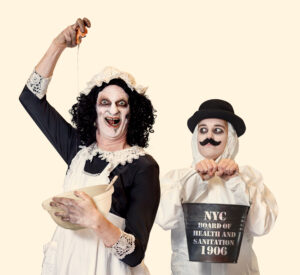
Reviewing theatre shows can be very fulfilling but always comes with Noel Coward’s advice for performers at the back of my mind: “Work hard, do the best you can, don’t ever lose faith in yourself and take no notice of what other people say about you.”
Of all the shows I watched in 2024, I particularly loved Hamilton and Mary Poppins at the Bristol Hippodrome, and Reverberation and My Mother’s Funeral: The Show in the Bristol Old Vic.
However, the pick of the bunch I reviewed for StageTalk were both performed in less grand venues demonstrating the power of small-scale theatre. Living Spit’s There’s Something About Typhoid Mary at the Wardrobe Theatre was a hoot, combining live cooking with hilarious scatological references. I described it as ‘highly contagious fun of pandemic proportions.’
The Fall Of The House Of Usher by Red Rope Theatre was performed in the gloriously gothic atmosphere within the Anglican chapel at Arnos Vale cemetery. The appeal lay not just in witnessing superb close-up performances but in the way the chilling, claustrophobic mood was expertly conjured up. More please for 2025!
GRAHAM WYLES 
We haven’t got a separate category of one man/woman shows, but, ‘Black is the Colour of My Voice’, Apphia Campbell’s biographical play about Nina Simone, more than holds its own in any category. Movingly and exquisitely sung and acted, the show has all one might want from a biographical drama that avoids the pitfalls of hagiography. It has depth, passion and revelation in an entertaining form that would have been as comfortable in a studio theatre as it was on the Bristol Old Vic stage.
Kim Brandstup’s Metamorphoses at the Ustinov, contrary-wise, showed how a dance piece can reveal layers of meaning in a studio that might go unnoticed on the more accustomed large stage for a modern ballet. Up close and personal with the dancers, their acting skills are as much in evidence as the dance and sheer athleticism. In this production Kristen Mcnally as Ariadne and Mathew Ball as Theseus were more than up to the scrutiny. Perhaps there is no greater praise for a ballet than to say words would have been irrelevant. Tommy Franzen as Dionisus was nothing if not thrilling as he managed to do a handstand on the side of the wall whilst seducing the abandoned Ariadne.
Over in the RSC’s Stratford home, director, Eleanor Rhode brought us a modern dress Midsummer Night’s Dream that one could relax into and enjoy for its novelty without becoming grumpy that Shakespeare had been messed around with too much. An accomplished cast had (as is often the case) a notable Bottom, this time given an outing by a suitably eager and comically bumptious Mathew Baynton.
Back in the Ustinov, Lindsay Posner’s revival of Miller’s American classic, A View From the Bridge, starring Dominic West, showed how the notion of a ‘culture clash’ has been eating away at society in various guises for well over three quarters of a century. West was superb in bringing out the contradictions of his character, Eddie, and post war American society.
Back in the Bristol Old Vic, Gareth Farr’s play, A Child of Science, about the battle to gain acceptance for IVF, gave us a different type of culture war, that between progress – scientific in this case – and the usual reactionary suspects. Experts are not infallible, but refusal to give them a proper hearing can cost and destroy lives.
Finally a mention for the Watermill Theatre at Newbury who gave us a well conceived stage version by David Seidler of his film, The King’s Speech. Cleverly bringing the perspective of a personal struggle, the debilitating stutter of the future George VI, to an epoch making event, the exceptional cast made full use of the quirky space as they drew us into one of the central events of the twentieth century. Like their fellow studio, The Ustinov, down the M4 the Watermill shows that quality material with quality acting and directing can produce results far more satisfying than many a large stage manages with greater resources.
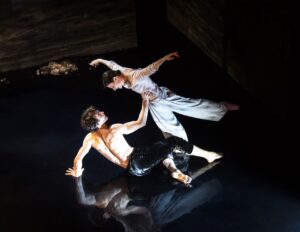
Photo credits: Johan Persson, Manuel Harlan, Marc Brenner, Seamus Ryan, Geraint Lewis, Foteini Christofilopoulou

